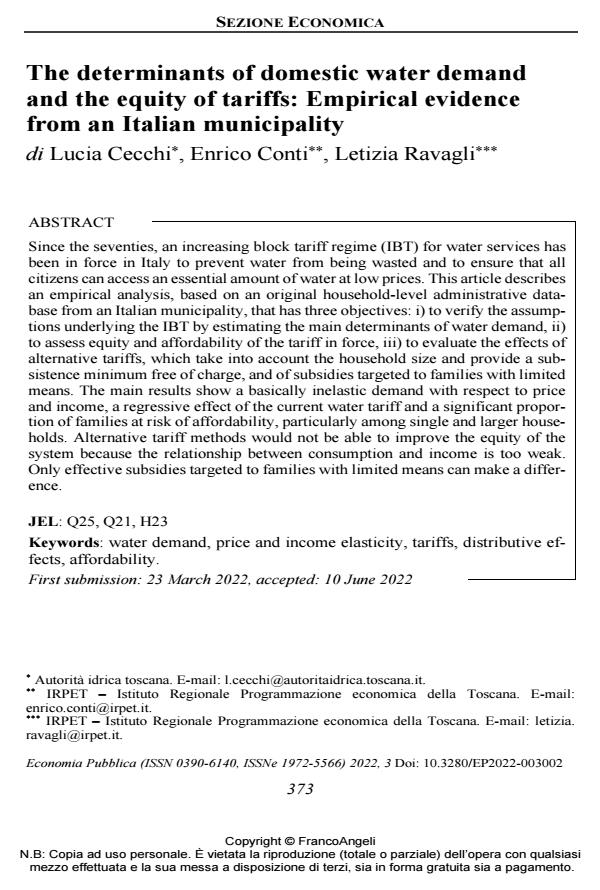The determinants of domestic water demand and the equity of tariffs: Empirical evidence from an Italian municipality
Titolo Rivista ECONOMIA PUBBLICA
Autori/Curatori Lucia Cecchi, Enrico Conti, Letizia Ravagli
Anno di pubblicazione 2022 Fascicolo 2022/3
Lingua Inglese Numero pagine 23 P. 373-395 Dimensione file 210 KB
DOI 10.3280/EP2022-003002
Il DOI è il codice a barre della proprietà intellettuale: per saperne di più
clicca qui
Qui sotto puoi vedere in anteprima la prima pagina di questo articolo.
Se questo articolo ti interessa, lo puoi acquistare (e scaricare in formato pdf) seguendo le facili indicazioni per acquistare il download credit. Acquista Download Credits per scaricare questo Articolo in formato PDF

FrancoAngeli è membro della Publishers International Linking Association, Inc (PILA)associazione indipendente e non profit per facilitare (attraverso i servizi tecnologici implementati da CrossRef.org) l’accesso degli studiosi ai contenuti digitali nelle pubblicazioni professionali e scientifiche
Since the seventies, an increasing block tariff regime (IBT) for water services has been in force in Italy to prevent water from being wasted and to ensure that all citizens can access an essential amount of water at low prices. This article describes an empirical analysis, based on an original household-level administrative data- base from an Italian municipality, that has three objectives: i) to verify the assump- tions underlying the IBT by estimating the main determinants of water demand, ii) to assess equity and affordability of the tariff in force, iii) to evaluate the effects of alternative tariffs, which take into account the household size and provide a sub- sistence minimum free of charge, and of subsidies targeted to families with limited means. The main results show a basically inelastic demand with respect to price and income, a regressive effect of the current water tariff and a significant propor tion of families at risk of affordability, particularly among single and larger house- holds. Alternative tariff methods would not be able to improve the equity of the system because the relationship between consumption and income is too weak. Only effective subsidies targeted to families with limited means can make a difference.
Parole chiave:water demand, price and income elasticity, tariffs, distributive effects, affordability
Jel codes:Q25, Q21, H23
Lucia Cecchi, Enrico Conti, Letizia Ravagli, The determinants of domestic water demand and the equity of tariffs: Empirical evidence from an Italian municipality in "ECONOMIA PUBBLICA " 3/2022, pp 373-395, DOI: 10.3280/EP2022-003002